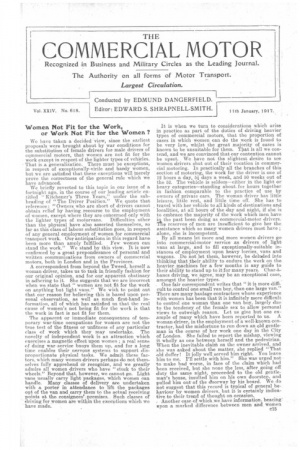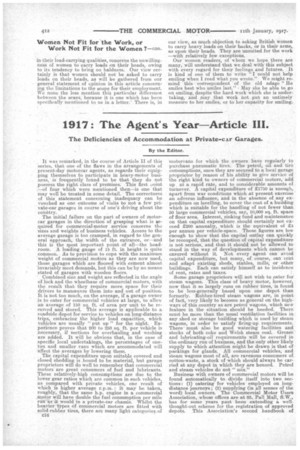Women Not Fit for the Work, or Work Not Fit for the Women ?
Page 1

Page 2

If you've noticed an error in this article please click here to report it so we can fix it.
We have taken a decided view, since the earliest proposals were brought about by war conditions for the substitution of female drivers for male drivers of eqmmercial motors, that women are not fit for the work except in respect of the lighter types of vehicles. That is a generalization. There must be exceptions, in respect of exceptionally-virile and hardy women, but we are satisfied that these exceptions will Merely prove the correctness of the general rule which we have advanced.
We briefly reverted to this topic in our issue of a fortnight ago, in the course of our leading article entitled Kitchener's Three Years," under the subheading of" The Driver Position." We quote that reference : " Owners who are short of drivers cannot obtain relief by having recourse to the employment of women, except where they are concerned only with the lighter types of motorvans. Difficulties other than the physical have also asserted themselves, so far as this class of labour substitution goes, in respect of any general employment of women for commercial transport work. Our anticipations in this regard have. been more than amply fulfilled. Few women can. stand the work." We stand by this view. It is now confirmed by a great preponderance of personal and written communications from owners of commercial motors, both in London and in the Provinces.
A correspondent from beyond the Tweed, herself a woman driver, takes us to task in friendly fashion for our original opinion, and for our apparent obstinacy in adhering to it. She suggests that we are incorrect when We state that "women are not fit for the work on anything but light vans." We wish to point out that our reason for believing this is based noon personal observation, as well as much first-hand information, all of which has satisfied us that the real cause of women's not being fit for the work is that the work in fact is not fit for them.
The apparent or immediate consequences of ternporary war-time occupations for women are not the true test of the fitness or unfitness of any particular class of work which they may undertake. The novelty of independent work is an attraction which exercises a magnetic effect upon women ; a real sense of doing war service buoys them up, and for a long time enables their nervous systems to support disproportionate physical tasks. We admit these factors, which many women drivers perhaps do not themselves fully apprehend 6r recognize, and we greatly admire all women drivers who have "stuck to their wheels." Beyond that, however, we cannot go. Light vans usually carry light packages, which women can handle. Many classes of delivery ane undertaken with a porter in attendance to lift the packages out of the van and carry them to the actual receiving points at. the consignees' premises. Such classes of driving for women are within the exceptions which we
have made.
It is when we turn to considerations which arise in practice as part of the duties of driving heavier types of commercial motors, that the proportion of cases in which women can do the work is found to be very low, whilst the great majority of cases is known to be unsuitable for them. That is all we contend, and we are convinced that our contention cannot be upset. We have not the slightest desire to see women drivers shut out of their vocation in commercial motoring. In practically all the branches of this section of motoring, the work for the driver is one of 12 hours a day, &i days a week, and 50 weeks out of the 52. The vehicle is seldom—either in the light or heavy categories—standing about, for hours together in fashion comparable to the practice of use by owners of private cars. The woman driver has little leisure, little rest, and little time off. She has to . travel with her vehicle to all kinds of destinations and localities, at all hours of the day and night., if she is to embrace the majority of the work which men have in the past been doing as commercial-motor drivers. The reserves of men are insufficient to give her the assistance which so many women drivers must have ; alone, she is incompetent.
By all means let more and more women drivers go into commercial-motor service as drivers of light vans at large, and to fill exceptionally-suitable instances of employment upon heavy lorries, vans and wagons. Do not let them, however, be deluded into 'thinking that their ability to endure the work on the heavier machines for a few months is any guide to their ability to stand up to it for many years. Char-abanes driving, we agree, may be an exceptional case, amongst the heavier types. . One fair correspondent writes that " it is more difficult to control one small yan boy, than one large van." There are many haulage contractors whose experience with women has been that it is infinitely more difficult to control one woman than one van boy, largely due to the tendency of the female sex to allow personal views to outweigh reason. Let us give but one example of many which have been reported to us. A woman driver, in the employment of a well-known contractor, had the misfortune to run down an old gentleman in the course of her work one day in the City of London. She failed to report the mishap, viewing it wholly as one between herself and the pedestrian. When the inevitable claim on the owner arrived, and she was asked about the matter, she replied "That
old duffer ! It jolly well served him right. You leave him to me. I'll settle with him." She was urged not • to make bad worse, in face of the claim which had been received, but she none the less, after going off duty the same night, proceeded to the old gentle man's house, insulted him on his own doorstep, and pulled him out of the doorway by his beard. We do not suggest that this record is typical of general behaviour by women drivers, but it is certainly indicative to their trend of thought on occasion.
Another case of which we have information, bearing upon a marked difference between men and women
in their load-carrying qualities, concerns the unwillingness of women to carry loads on their heads, owing to its tendency to bring on baldness. Our view certainly is that women should not be asked to carry loads on their heads, as will be gathered from our general statement of c,pinion in this article concerning the limitations to the scope for their employment. We none the less mention this particular difference between the sexes, because it is one which has been specifically mentioned to, us in a letter. There is, in
our view, as much objection to asking British women to carry heavy loads on their backs, or in their arms, as upon their heads. They are unsuited for the work —with relatively few exceptions. Our women readers, of whom we hope there are many, will understand that we,deal with this subject with every regard for their feelings and futures. It is kind of one of them to write I could not help smiling when I read what you wrote." We might remind this correspondent of the old adage "He smiles best who smiles last." May she be able to go on smiling, despite the hard work which she is undertaking, and may that work not put an untimely measure to her smiles, or to her capacity for smiling.






















